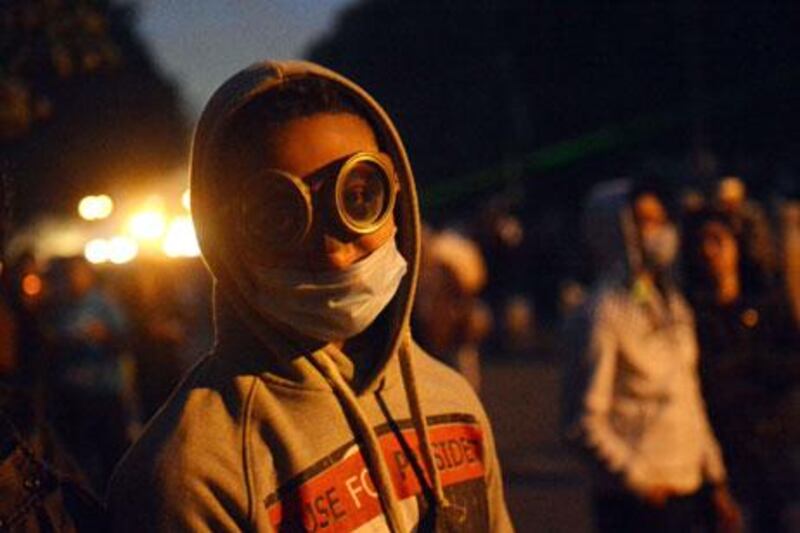CAIRO // Mohammed Morsi declared a state of emergency in three Egyptian cities yesterday and his cabinet gave soldiers the power to arrest civilians.
At least one person died in a fierce exchange of rocks and tear gas canisters near Tahrir Square, bringing the death toll in five days of violence to at least 47, with hundreds more injured. Medical officials reported another person was killed in Port Said late last night as thousands of people marched through the streets in defiance of a 9pm curfew.
"We are on the streets because no one can impose their will on us. We won't bow to the government," a resident of Port Said, Mahmud Abu Al Majd, told Agence France-Presse.
The president announced a 30-day state of emergency in three cities along the Suez Canal - Port Said, Ismailia and Suez - where fighting has been the most intense, and offered a new "national dialogue" with the opposition to calm escalating confrontations.
Protests in the three cities were sparked in part by the sentencing on Saturday of 21 men to death for their role in a football riot in Port Said last year in which 79 people died, and which many believe was the work of saboteurs from the ousted regime of Hosni Mubarak.
The verdict followed the second anniversary of the uprising against Mubarak, mixing bitterness felt by families of the accused with discontent over Mr Morsi's conduct since his inauguration in June.
Giving the military the power of arrest is viewed by some as a sign that the government is retreating to the harsh measures used by Mubarak to prevent the collapse of his government in 2011.
The law would give the army police powers, but those arrested would be tried in civilian courts and not in military tribunals.
Egypt was under a state of emergency for more than three decades from the assassination of president Anwar Sadat in 1981 until May last year, a month before Mr Morsi was elected. Ending the state of emergency was a key demand of protesters who toppled Mubarak.
A year ago yesterday, police and protesters fought in what is remembered as the "Day of Rage", when Mubarak called in the army to restore security and asked the opposition to enter into dialogue.
The umbrella opposition group, the National Salvation Front, refused Mr Morsi's invitation to talk, and demanded that he suspend the constitution and appoint a new unity government before they meet. Mohammed ElBaradei, the head of the Dostour party and a key figure in the Front, said the group would not meet the president because dialogue without meeting their demands would "lead to a dead end".
Mr ElBaradei also wants Mr Morsi to take legislative powers from the Islamist-dominated upper house of parliament, the Shura Council, a usually toothless body elected early last year by less than 10 per cent of Egypt's registered voters. "We support any dialogue if it has a clear agenda that can shepherd the nation to the shores of safety," said Mr ElBaradei, flanked by the former Arab league chief Amr Moussa and leftist politician Hamdeen Sabahi.
Members of the Muslim Brotherhood, in which Mr Morsi was a leading figure before becoming president, struck back at the opposition yesterday in increasingly harsh tones.
Gamal Heshmat, a member of the Egyptian Senate, said: "The blood of Egyptians shed in recent clashes, over the past few days, is the responsibility" of the National Salvation Front, and he blamed opposition members for attacks on Muslim Brotherhood offices.
And Ahmed Diab, an official in the Brotherhood's Freedom and Justice Party, said the opposition "wants to give political cover to justify its involvement in continuing violent crimes their members are committing, including attempted murder, arson, burglary, sabotage and vandalism.
"But they cannot so fast wash their hands of the blood of Egyptians they shed in one way or another," he said.
The comments from the two sides - one calling for the downfall of the regime and the other blaming chaos on selfish political groups - revealed the deepening polarisation in Egypt.
"We want to bring down the regime and end the state that is run by the Muslim Brotherhood," said Ibrahim Eissa, a 26-year-old cook, protecting his face from tear gas.
The consequences of the shocks of instability could be felt across the country. Some schools in Cairo closed down early and companies allowed staff to go home for security reasons.
Officials said traffic was flowing along the Suez Canal, but any further unrest could upset the country's already battered economy. Many of the protesters over the past several days have said a lack of social justice was a driving concern.
* Additional reporting by the Associated Press and Reuters
twitter: For breaking news from the Gulf, the Middle East and around the globe follow The National World. Follow us





